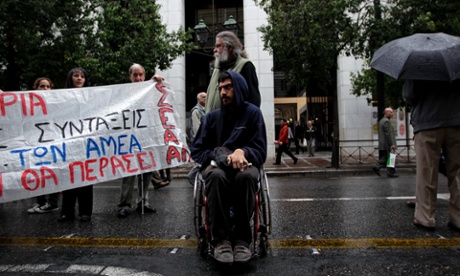http://www.infowars.com/nigel-farage-on-the-total-subjugation-of-europe/
Nigel Farage On The Total Subjugation Of Europe
zerohedge.com
October 23, 2012
October 23, 2012
Forget black swans, Nigel Farage is rapidly turning himself into the black sheep of the EU Parliament with his constant stream of truthiness and honest pragmatism. It seems the broadly nodding-donkeys that fill the chamber remain cognitively dissonant to any and everything in the real world – hanging instead on the next soundbite from Van Rompuy or Barroso on how well things are going, or how the crisis is ‘almost’ over. If only the Germans would bless them all with their money. In one his plainest-speaking rants, Farage provides clarity to his ‘peers’ on just exactly what the bailouts of Greece, Portugal, Ireland, and soon to be Spain and Italy are actually about – the “total subjugation of the states to a completely undemocratic structure in Brussels.” Is it any wonder Samaras and crew – while happy to accept cash and make promises – are pulling away from yet another (this time is the last time) Troika-driven austerity push? “The euro-zone is in a very dark place; economically, socially, and politically.”
Some mind-blowing quotes in here as Farage refers to the leaders of Italy and Spain and their remarkable nonsense…
Listen to the entire 3:30 – it is frightening just what is occurring on the ground across the pond from a US nation with eyes only for the election for now…
and....
http://globaleconomicanalysis.blogspot.com/2012/10/spanish-home-loans-plunge-285-to-record.html
Tuesday, October 23, 2012 2:48 PM
Spanish Home Loans Plunge 28.5% to Record Lows; Brussels Revises Spain’s Deficit Upward to 9.4% of GDP
The implosion in Spain continues, with the budget deficit heading in reverse, now revised up to 9.4% of GDP. [Correction: 9.4% was upward revision for 2011. The upward revision for 2012 is "only" 7.3%]
Spain's original deficit target for 2012 was 4.4%, then revised to 5% then 5.3%. Yet another revision brought the target all the way up to 6.3%. So how is Spain doing? A few flashbacks will explain.
On April 10 I optimistically wrote Inconsistencies in Spain's Budget Suggest Deficit will be 7% not 5.3%
"I have been saying for what seems like forever that Spain would not makes its budget. It won't, and we have a starting point for how bad it might get."
Indeed "starting point" was the operative phrase as 7% was reached by June.
Spain's original deficit target for 2012 was 4.4%, then revised to 5% then 5.3%. Yet another revision brought the target all the way up to 6.3%. So how is Spain doing? A few flashbacks will explain.
On April 10 I optimistically wrote Inconsistencies in Spain's Budget Suggest Deficit will be 7% not 5.3%
"I have been saying for what seems like forever that Spain would not makes its budget. It won't, and we have a starting point for how bad it might get."
Indeed "starting point" was the operative phrase as 7% was reached by June.
On June 26, I wrote Spain Has Budget Deficit of 3.41% of GDP Through May (Not Counting Regional Governments); Target for Entire Year was 3.5%
That brief moment of 7% did not last long.
On September 21 I wrote Spain's Fiscal Deficit 8.56% of GDP in First Half; Impossible Second Half Targets.
That did not last long either.
Brussels Revises Spain’s Deficit Upward to 9.4% of GDP
Today we learned from El Pais English edition that Brussels Revises Spain’s Deficit Upward to 9.4% of GDP
That brief moment of 7% did not last long.
On September 21 I wrote Spain's Fiscal Deficit 8.56% of GDP in First Half; Impossible Second Half Targets.
That did not last long either.
Brussels Revises Spain’s Deficit Upward to 9.4% of GDP
Today we learned from El Pais English edition that Brussels Revises Spain’s Deficit Upward to 9.4% of GDP
The European Union’s statistics office, Eurostat, on Monday said it had revised Spain’s public deficit for last year upward from 8.5 percent of GDP to 9.4 percent to reflect state injections of capital into nationalized banks.
That put Spain on a par with Greece and only behind Ireland, whose shortfall was 13.4 percent of GDP, in the EU. In contrast the average deficit in the EU fell to 4.4 percent of GDP, down from 6.5 percent in 2010, while the shortfall in the euro zone declined to 4.1 percent from 6.2 percent. Seven countries in the EU had deficits above the bloc’s ceiling of 3 percent of GDP.
Eurostat also revised the deficit for Spain for 2010 upward from 9.3 percent to 9.7 percent to reflect unpaid bills by the public administrations. “The increase in the deficit for 2010 is mainly due to the previously unrecorded unpaid bills in the state and local government sub-sectors,” Eurostat said. “The increase in the deficit for 2011 is mainly due to the reclassification of capital injections by the central government in Catalunya Caixa Bank, NCG Bank and Unnim Bank.”Optimistic Nonsense
The article continues with blatantly optimistic nonsense from the IMF and even more absurd statements from Spanish officials.
"Given the weak state of the Spanish economy, which is expected to contract 1.5 percent this year and 1.3 percent next year, the IMF has thrown doubt on the government’s ability to meet its deficit-reduction target for this year and the following, which is 4.5 percent of GDP. The IMF believes Spain will not be able to meet the 3-percent target until 2017, although the government has pledged to do so by 2014."
The IMF targets are ridiculous enough, but Spain's likelihood of achieving its government pledge of 3% by 2014 are simply laughable.
Spanish Home Loans Plunge 28.5% to Record Lows
Also from El Pais English edition, please consider Home loans granted drop to record lows
The number of home loans granted by lenders in Spain fell to their lowest levels on record in August as tight credit conditions and high unemployment continued to depress the mortgage market despite a fall in prices.Reflections on Non-Performing Loans
According to figures released Monday by the National Statistics Institute (INE), the number of loans disbursed fell 13.1 percent from July and 28.5 percent from August 2011 to 21,106, the lowest figure since the INE began compiling the current series in 2003.
According to official figures released last week, house prices have fallen 25 percent from their peaks at the start of 2008. Experts reckon they will have to fall more to clear an estimated pile of 670,000 new housing units built up over a decade-long boom that came to an abrupt halt around the start of 2008.
Apart from a lack of liquidity, the country’s banks are also grappling with a jump in loan defaults as the country slipped back into recession. Non-performing loans in the banking sector hit a record high of 10.5 percent of total lending in August.
With non-performing loans at 10.5% expect more bank bailouts while noting that Spain's injection of capital into banks is the reason for the latest jump in debt-to-GDP ratios.
The sane thing to do would be to simply let failed banks fold, but instead governments bail out the banks at taxpayer expense.
Finally, the official stats of a mere 25% drop in home prices since the peak, are a believable as the tooth fairy.
Addendum:
That 9.4% was an upward revision for 2011.
Reader Bran informs me that 2012 is only up to 7.3% but various officials still claim for 6.3%.
From Libre Mercado: Montoro contradicts the compliance deficit in 2012
"Finance Minister Cristobal Montoro claims in Congress that Spain will reduce the deficit to 6.3% of GDP in 2012, but communicates to Brussels to be located at 7.3%."
With first-half deficit of 8.56% the target of 6.3% is of course impossible.
Mike "Mish" Shedlock
and......
http://www.telegraph.co.uk/finance/financialcrisis/9629293/Debt-crisis-Europe-ratchets-up-grip-on-Madrid.html
BNM Mare Nostrum, and other mid-tier "Group 2" banks such as Popular, Caja 3, and Liberbank, have little chance of tapping the markets to cover most of their capital deficits, according to Troika officials.
They are also losing patience with the glacial pace of cuts at Bankia and other nationalised lenders such as Catalunya-Caixa and Banco Valencia,according to the Spanish newspaper El Confidencial.
Brussels fears a repeat of the fiasco at Bankia, which had to be rescued just weeks after its recapitalisation plans had been approved. "We have had too many bad experiences with financial restructuring in Spain to be sure the plans will work this time," said one official.
Some of the banks are assuming large capital gains on assets that are in fact deeply underwater, and are counting on a 20pc rise in the IBEX index of stocks by the end of the year.
Madrid may see the escalating demands of the Troika as a foretaste of what could happen if Spain requests a sovereign rescue from the European Stability Mechanism (ESM), the pre-condition for the European Central Bank to start buying Spanish bonds.
and....
| |||
|
http://www.guardian.co.uk/business/2012/oct/23/eurozone-crisis-greek-cuts-spanish-bailout#block-508643b958f96784ee290950
Greece talks end without agreement
News in from our correspondent Helena Smith who confirms that Greece's politicial leaders have failed to make headway on the draconian €13.5bn package of spending cuts the debt-stricken country has been set as a condition for further aid.
Fotis Kouvellis, who heads the tripartite government's Democratic Left party, has emerged from more than two hours of talks saying that labour reforms remain the biggest stumbling block. The leftist leader described as "unacceptable" the demands being placed on Greece by its "troika" of creditors at the EU, ECB and IMF. "These demands [for mass layoffs, cuts in severance pay and reduction of the minimum wage] will be of no fiscal benefit for our country ... they will simply feed unemployment and further burden a recession that is already huge," he said. "My position is unchanged. I will not agree to them."
It appears the talks are now over for the day and it is, as yet, unclear when the leaders will meet again. Aides are now saying that Kouvellis' position makes it very difficult for socialist Pasok party leader Evangelos Venizelos to agree to the reforms.
Updated
Latest from Greece
As the Greek coalition government's meeting continues (see 13.25), politicians have been discussing the need to agree the cuts demanded by the Troika (our Athens correspondent Helena Smith reports)
Development minister Costis Hadjidakis set the scene for further painful austerity by predicting:
[Winning] the next aid instalment is a national effort that we are doomed to win
adding that “Liquidity is key.”
But main opposition leader Alexis Tsipras said while Greece needed the money “not one euro will go to the real economy”.
Instead, he said, almost all of the €31.5bn instalment will go to banks which stand to be recapitalised to the tune of €25bn.
And with that, my colleague Nick Fletcher will see you home. Cheers all.GW
Updated
STUDENTS PROTEST IN ATHENS
At least two different protests have been taking place in Athens today.
Students, including some studying art and music, gathered outside the Greek parliament to demonstrate against budget cuts affecting education spending and transport to schools.
Here are a few photos:
 Photograph: LOUISA GOULIAMAKI/AFP/Getty Images
Photograph: LOUISA GOULIAMAKI/AFP/Getty Images
A student plays the trumpet as others dance around her during today's anti-austerity protest. Photograph: YORGOS KARAHALIS/REUTERS A student holding an artist's palette and fingers saying ART takes part in today's protest. Photograph: Petros Giannakouris/AP
A student holding an artist's palette and fingers saying ART takes part in today's protest. Photograph: Petros Giannakouris/AP

 A student holding an artist's palette and fingers saying ART takes part in today's protest. Photograph: Petros Giannakouris/AP
A student holding an artist's palette and fingers saying ART takes part in today's protest. Photograph: Petros Giannakouris/AP
Elsewhere in the capital, another demonstration against changes in the benefits paid to people with disabilities was taking place, protesting against plans to suspend disability pensions and benefits until they are re-evaluated by the Disability Certification Centres (KEPA).

People with disabilities take part in a march against the government's new austerity measures outside the labour ministry in central Athens. Photograph: Petros Giannakouris/AP Photograph: ALKIS KONSTANTINIDIS/EPA
Photograph: ALKIS KONSTANTINIDIS/EPA
 Photograph: ALKIS KONSTANTINIDIS/EPA
Photograph: ALKIS KONSTANTINIDIS/EPA
Similar demonstrations were held in 36 other cities outside KEPA offices.
and.....
http://www.zerohedge.com/news/2012-10-23/greece-kills-bond-buyback-proposal
Greece Kills Bond Buyback Proposal
Submitted by Tyler Durden on 10/23/2012 17:23 -0400
One of the zanier proposals floated in the past few weeks, yet sufficient to send Greek bonds soaring to post-restructuring highs on hopes of a take out, was the suggestion that Greece would repurchase its fresh-start bonds in the open market, which recently traded in the teens, and have since virtually doubled, at a price ~25 cents of par. Obviously since the price of the bonds had been much lower, even the mere possibility of what is termed in the industry as a distressed buyback, sent everyone scurrying to purchase the paper, as if it had any intrinsic economic value (it did not), instead of mere hopes that Greece would throw even more good money after bad (especially since the fresh start bonds have a meaningless cash coupon and nobody expects them to be repaid at maturity). There is also the detail that a distressed buyback is, for the rating agencies, equivalent to an Event of Default, but knowledge of that small fact would be demanding too much out of those who scrambled in the latest chase for yield. Anyway, with all that said, it now appears that the whole idea is over, with Greek Kathimerini reporting moments ago that Greece has scuttled the proposal for a bond buyback.
From Kathimerini:
The Finance Ministry is ditching banks’ plan for a bond swap that would have eased their recapitalization requirements.
According to sources, Minister Yannis Stournaras has rejected the proposal that local banks presented to him, suggesting that this would be a move that would benefit bank shareholders disproportionately. Ministry sources added that such a move would generate accusations about favorable treatment of banks in comparison with other holders of Greek bonds.
That is also the view by the troika – i.e. the representatives of Greece’s creditors – who had earlier rejected a similar plan.Nowadays domestic lenders have in their portfolios bonds issued after the March 2012 bond exchange, known through the acronym PSI (Private Sector Involvement), which have a nominal value of 14 billion euros but are traded at 35 basis points, which means their current value stands at 4.5 billion euros. Due to this difference, banks are burdened by accounting losses of 9 billion euros, which a bond swap would practically erase as the new bonds would have been closer to the nominal value of the existing ones.
So much for Greylock and their deja vu as of last week comment of the "slam dunk" trade of the year.
At least there is some hope left: those who followed this development closely and were as amused as us by the inherent stupidity involved, and traded accordingly, are about to make money on an otherwise very insolvent country one more time.
and.....
http://www.zerohedge.com/news/2012-10-23/if-becomes-when
"If" Becomes "When"
Submitted by Tyler Durden on 10/23/2012 18:41 -0400
And yet don't look too good, nor talk too wise:
Via Mark J. Grant, author of Out of the Box,
If you can keep your head when all about you
Are losing theirs and blaming it on you,
If you can trust yourself when all men doubt you,
But make allowance for their doubting too;
If you can wait and not be tired by waiting,
Or being lied about, don't deal in lies,
Or being hated, don't give way to hating,
Are losing theirs and blaming it on you,
If you can trust yourself when all men doubt you,
But make allowance for their doubting too;
If you can wait and not be tired by waiting,
Or being lied about, don't deal in lies,
Or being hated, don't give way to hating,
-Rudyard Kipling
- If the Central banks are done printing
- If there is to be no more flood of liquidity spilling into the world that required Noah’s Ark
- That buoyed the equity markets; that compressed the bond markets
- If the ECB will never do one thing because the EU cannot agree on them to do it
- If Greece cannot agree on the mandated austerity measures and so new elections are called
- If Spain asks for money and Germany says it is a legacy issue and it is Spain’s problem
- If money for Cyprus cannot be agreed to
- If Portugal appears back at the till
- If Catalonia decides that it no longer wishes to be part of Spain
- If China has a slow-down which is far past the common thinking
- If a new leader appears in Germany who wants to retain the nation for its people
- If the nations in Europe cannot agree on a banking supervisor or while funding the ESM refuse to hand over their country’s money to other nations any longer
- If the recession in Europe is worsening and deepening and broadening and the distance across the Atlantic shrinks by the recession’s intensity
Then “If” is no longer “If” and it grows up and becomes “When” and perhaps that moment has begun and the consequences will be soon enough.


 69 Comments
69 Comments

